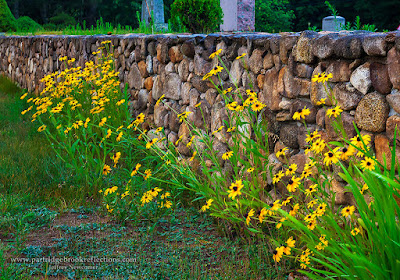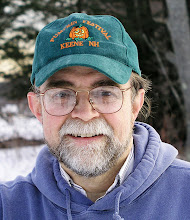 |
With Thanks to Sir Isaac Newton
Summer is the season of rainbows. They are a magical, improbable manifestations of nature, which often seem to appear without warning and
disappear just as quickly. It is no
wonder that they have long been associated with mystical properties, including
the fabled pot of gold at their base. Last
week I was reminded that, although they are beautiful, rainbows are actually
just a simple manifestation of the prismatic effect of light bouncing through
rain drops and that, given the right conditions, their occurrence can often be predicted.
 |
| Raindrop Physics |
About four years ago, I published a blog article about rainbow photography, and last week I was once
again able to put to work what I learned from my own research. I was at home when a strong summer downpour passed
through my village of Spofford New Hampshire. I was just getting ready to settle into our gazebo to for some writing,
but instead I
 |
| Double Rainbow - Opposite Color Spectrum |
decided to do a little rainbow chasing. I knew that rainbows often form as lines of showers
pass by. The storm must also be followed by unobstructed sun shining through to catch the rain drops at a low enough angle to be reflected
back and refracted, separating the light into its full visual spectrum. The secret is to place the sun at your back
and look into the rain clouds as they move away.
 |
| Full Unobstructed Rainbows are Easier to Find on the Coast Rye Beach, New Hampshire |
First Find a Rainbow
On this day, I was a little
late in recognizing the conditions. I had no rainbow in Spofford, but I had a
reasonable idea where one might form. I grabbed
my camera bag, jumped into the car and headed west toward Keene in hopes of
catching up to the receding edge of the storm.
I first reached my rainbow on the
outskirts of the city.
Find a Foreground
 |
| Nice Color but Distractions along Route 12 |
The two key steps which lead to great rainbow images are first, find a rainbow. The second is to find something interesting
to put in front of the garishly colored arch.
I have seen innumerable pictures of dramatic rainbows spoiled by weak and
distracting foregrounds. Telephone
poles, wires, housing projects, windshields and highway overpasses, all may provide a sense of place, but they tend
transform the magic into just an uninspiring smear of color across an ugly distracting foreground. Once you find your rainbow your
next thought should always be “where can I go to put something of interest in
front of it, that is also close enough to get to before the rainbow fades”.
 |
| First Rainbow |
As I moved into Keene, my
choices for foregrounds were
limited. I needed to get away from all
the layers of development. I careened down a industrial park service road and drove beyond
the buildings to be able to shoot down the dead end circle and into the trees
of the an old Ash swamp. Not a great
foreground, but I got a reasonably good arching rainbow. After capturing the “fact” of the rainbow, the next step was to try to get a more
complete and balanced image.
Chasing the Storm's Edge
 |
| Cemetery Gazebo |
I headed out chasing the
color, always angling west, to keep myself on the critical back edge of the storm
with the unobstructed sun to my back. Given
the location of the rainbow and its direction of motion, I didn’t think I would
get much from Keene and so I headed southwest on route 12. A couple of times the colors seemed to be
fading, but then I caught up with the storm. I had in mind a spot in Troy that I though would give me a long view, and some nice unobstructed perspectives. My target was a cemetery just outside of the
village, that sits on a knoll with a clear view to Mt Monadnock. On this day the storm was obscuring the
mountain, but the color was still there,
shining brightly against the receding dark clouds.
 |
| Rain Drops |
I first grabbed a couple of
multi-image panoramas, to capture the full arc of the colors. My first attempt was marred by multiple rain
drops which caused smudges on my lens. The problem with multi-image panoramas is that any dust or smudges repeat across each of the frames which are merged into the final image. I cleaned the lens, but my
second attempt, although clean, was not as dramatic.
 |
| Content Aware Fill |
 |
| Post Fill |
I ended up spending too much time in
Photoshop using combinations of Content Aware Fill and the Healing Brush to remove all the drops, but the pain fades, and I am happy with the results. The cemetery also has a nice Gazebo up on the
hill. I had used it in the past for a
foreground and once again I was able to combine it with a vivid portion of the
rainbow to construct an effective image.
 |
| Worth the Tedium |
 As the sun dipped into the
clouds on the horizon, I was finally forced to give up the chase. I was still able to catch some of the warm light on the Black Eyed Susan decorated cemetery wall and, later, the clear sky opened for a nice view of the craters of the moon.
As the sun dipped into the
clouds on the horizon, I was finally forced to give up the chase. I was still able to catch some of the warm light on the Black Eyed Susan decorated cemetery wall and, later, the clear sky opened for a nice view of the craters of the moon.
Given that I left home with only the
potential for a rainbow, I was happy with my results. It just goes to prove that, with a little
physics, we don’t have to depend on pure
luck to capture one of nature’s most colorful shows.
partridgebrookreflections.com
603-363-8338


This rainbow looks wonder .
ReplyDelete